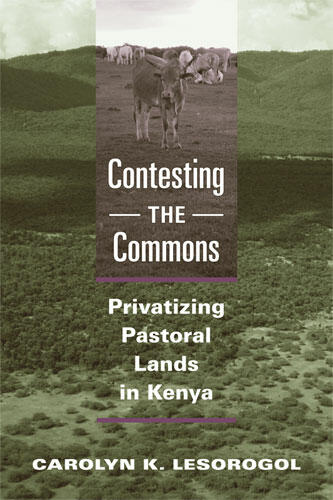Contesting the Commons
Privatizing Pastoral Lands in Kenya
Examines the highly disputed idea of privatizing communal land through one Samburu community
Description
Over centuries, African pastoralist societies have crafted institutions that enable them to survive in their harsh, semi-arid environment. Effectively managing communally held land has been one key to their success and a cornerstone of their social organization. Over the last two decades, however, a number of pastoralist communities have sought to transform their land tenure systems from communal to private ownership. In Contesting the Commons, Carolyn K. Lesorogol draws on eighteen months of fieldwork and ten previous years of work and residence among the Samburu to ask: What accounts for this challenge to an important, well-adapted, and seemingly highly functional institution? What are the effects of privatization of land on household well-being, individual behavior, and social relations? How can understanding the trajectory of institutional change in this case help us comprehend the dynamic processes of social transformation in general?
"Contesting the Commons is one of the best books that I have read on the politics of land and social order in Africa. Lesorogol offers a creative and nuanced approach to questions of property rights and social norms. This is a very impressive addition to the general literature on institutional change."
---Jack Knight, Sidney W. Soeurs Professor of Government, Department of Political Science, Washington University in St. Louis
Carolyn K. Lesorogol is Assistant Professor of Sociocultural Anthropology at George Warren Brown School of Social Work, Washington University in St. Louis. She was a consultant for the National Science Foundation project, "The Roots of Human Sociality: An Ethno-Experimental Exploration of Economic Norms in 16 Small-Scale Societies," from 2001-2004, and she has also received a National Science Foundation grant and a Fulbright-Hays grant.
Carolyn K. Lesorogol is Assistant Professor of Sociocultural Anthropology at George Warren Brown School of Social Work, Washington University in St. Louis. She was a consultant for the National Science Foundation project, "The Roots of Human Sociality: An Ethno-Experimental Exploration of Economic Norms in 16 Small-Scale Societies," from 2001-2004, and she has also received a National Science Foundation grant and a Fulbright-Hays grant.

